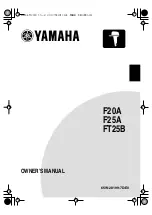
General information
Safety information
●
Before mounting or operating the outboard
motor, read this entire manual. Reading it
should give you an understanding of the
motor and its operation.
●
Before operating the boat, read any own-
er’s or operator’s manuals supplied with it
and all labels. Be sure you understand each
item before operating.
●
Do not overpower the boat with this out-
board motor. Overpowering the boat could
result in loss of control. The rated power of
the outboard should be equal to or less than
the rated horsepower capacity of the boat.
If the rated horsepower capacity of the boat
is unknown, consult the dealer or boat man-
ufacturer.
●
Do not modify the outboard. Modifications
could make the motor unfit or unsafe to use.
●
Incorrect propeller selection and incorrect
use may not only cause engine damage,
but also adversely affect fuel consumption.
Consult your dealer for correct use.
●
Never operate after drinking alcohol or tak-
ing drugs. About 50% of all boating fatalities
involve intoxication.
●
Have an approved personal flotation device
(PFD) on board for every occupant. It is a
good idea to wear a PFD whenever boat-
ing. At a minimum, children and non-swim-
mers should always wear PFDs, and
everyone should wear PFDs when there
are potentially hazardous boating condi-
tions.
●
Gasoline is highly flammable, and its va-
pors are flammable and explosive. Handle
and store gasoline carefully. Make sure
there are no gas fumes or leaking fuel be-
fore starting the engine.
●
This product emits exhaust gases which
contain carbon monoxide, a colorless,
odorless gas which may cause brain dam-
age or death when inhaled. Symptoms in-
clude nausea, dizziness, and drowsiness.
Keep cockpit and cabin areas well ventilat-
ed. Avoid blocking exhaust outlets.
●
Check throttle, shift, and steering for proper
operation before starting the engine.
●
Attach the engine stop switch lanyard cord
to a secure place on your clothing, or your
arm or leg while operating. If you acciden-
tally leave the helm, the cord will pull from
the switch, stopping the engine.
●
Know the marine laws and regulations
where you will be boating—and obey them.
For basic boating rules, see “Rules of the
road” on page 5.
●
Stay informed about the weather. Check
weather forecasts before boating. Avoid
boating in hazardous weather.
●
Tell someone where you are going: leave a
Float Plan with a responsible person. Be
sure to cancel the Float Plan when you re-
turn.
●
Use common sense and good judgment
when boating. Know your abilities, and be
sure you understand how your boat han-
dles under the different boating conditions
you may encounter. Operate within your
U69M14E0.book Page 3 Monday, June 6, 2005 2:53 PM
limits, and the limits of your boat. Always
operate at safe speeds, and keep a careful
watch for obstacles and other traffic.
●
Always watch carefully for swimmers during
the engine operation.
●
Stay away from swimming areas.
●
When a swimmer is in the water near you
shift into neutral and shut off the engine.
●
Do not illegally discard empty containers
1






































